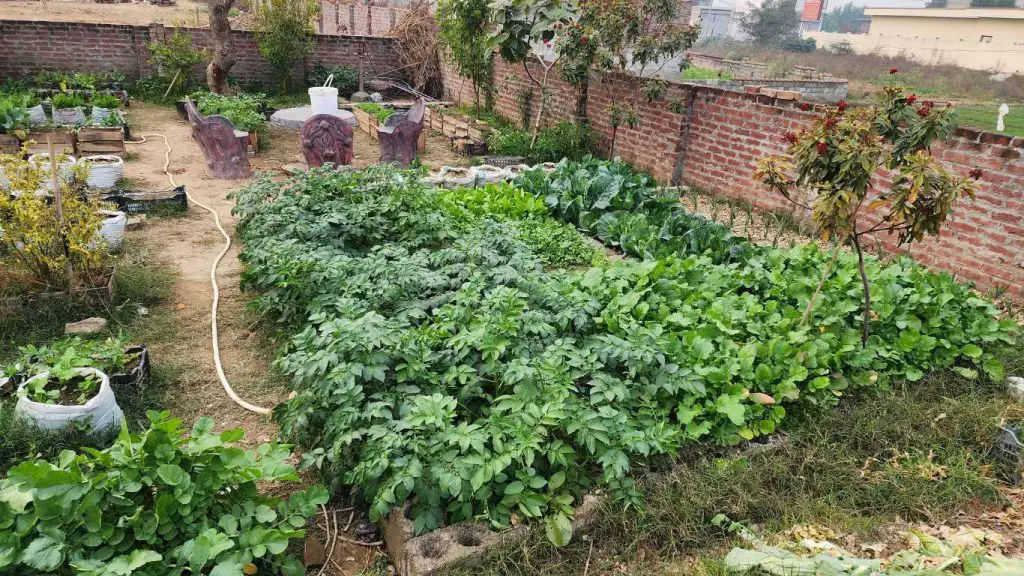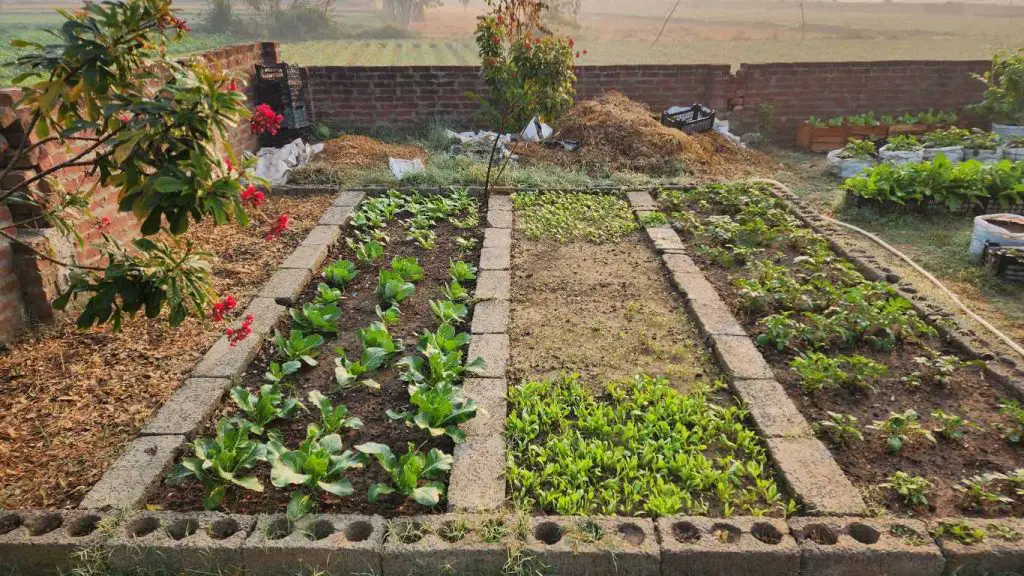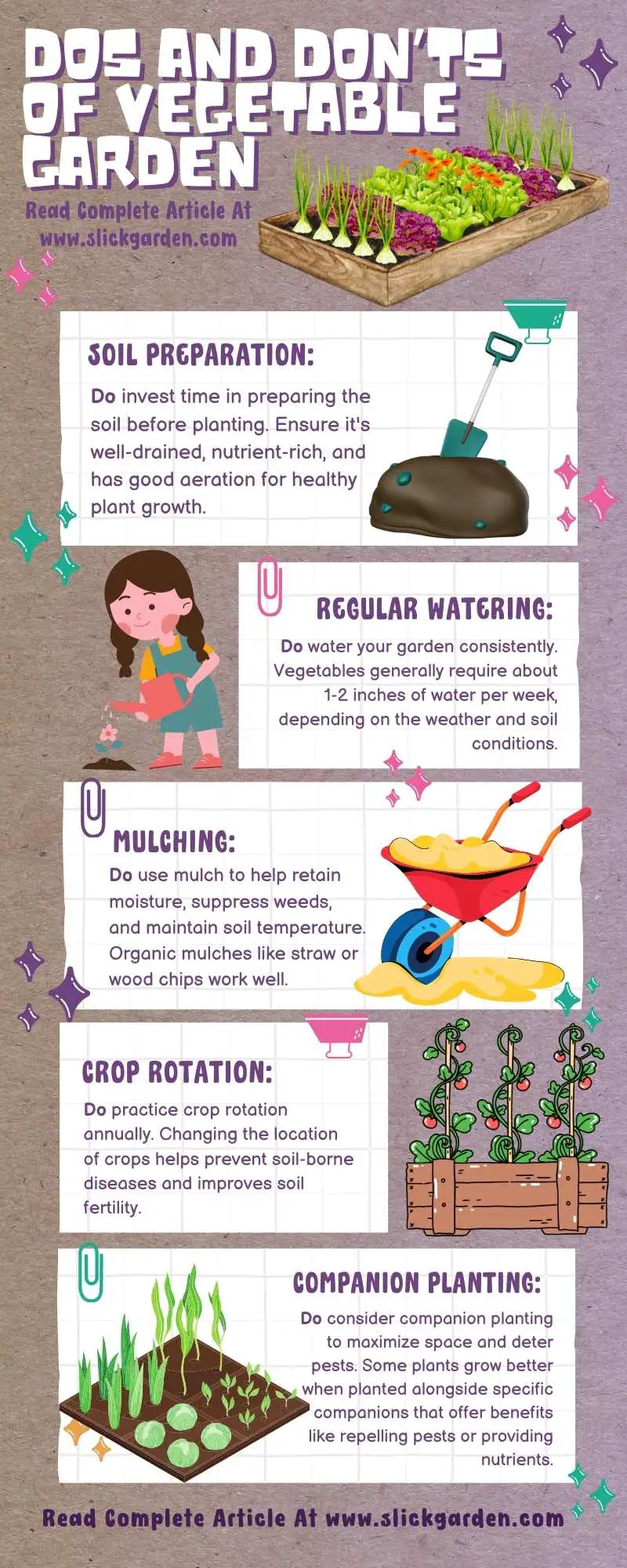Vegetable gardening is a challenging task but if you follow some basic rules then you will increase your chances of success. The following dos and don’ts will help you establish a flourishing vegetable garden.

The Dos Of Vegetable Garden
Following are the dos which should be followed when you are planning a vegetable garden.
1- APPLY COMPOST
Organic material helps the plants to produce higher yields for you. You should apply 2 inches of compost every year to fulfill the requirement of nutrients for your plants.
When your vegetable plants get all the essential organic material then they will produce tasty veggies for you.
Most experienced gardeners make compost but beginners can buy it from any nursery or gardening store. Making compost at home is not difficult, you only need waste material from the kitchen to make this valuable material.
2- SELECT A SUNNY LOCATION
Plants need full sun exposure for better yield. The location of your vegetable garden plays a very important role in your success. You must choose a sunny spot in case your plants are not receiving the quality of sunlight then they will not produce a high-quality crop for you.
Make sure they are receiving at least 6 to 8 hours of sunlight. Some plants also grow well in the partially shady area but not all the plants. If you want a productive vegetable garden then you should focus on the sunlight first.
3- DO WATER REGULARLY
The ideal time for watering your plant is in the morning when the sun is not shining brightly. During the day when the temperature is high, the roots will not absorb water properly.
If you are growing your plants in a container or pots then you must examine the soil twice a day. If it feels dry then water your plants. Never allow the soil to dry as it can damage your plants.
Every vegetable plant needs enough water to survive. Some plants need more water so you should maintain a frequency of water. Inconsistent watering habits will not give you the desired results.
4- DO ADD MULCH
If it is not easy for you to maintain a frequency of water then you can use a mulch to cover the soil. You can use chopped leaves, straw, grass clipping, cardboard, newspaper, and even sawdust as a mulching material.
To maintain the moisture level in the soil you can apply 1 to 2 inches of mulch on the soil. It will help to stop the growth of weeds and retain moisture. Mulch also helps to break down organic material such as compost.
5- USE COVER CROPS
These crops are grown in the off-season. Cover crops such as grasses or legumes help in the improvement of the soil and boost the yield. They suppress weeds and protect your soil from erosion.
Your main vegetable crops grow well when the fertility of the soil improves. There are no serious drawbacks of cover crops but it will result in healthier vegetable crops for the next growing season.
6- MANUAL PESTS CONTROL
Pests are a big problem for you as they spread diseases in your vegetable plants.
You can avoid using chemicals such as herbicides and pesticides because they will be harmful to your plants. You can easily deal with them by following ways.
- Aphids are a big problem but you can use liquid insecticidal soap, some drops of dish soap, and peppermint essential oil. The solution will be great for fighting affairs.
- If you mix baking soda and flour and spread this mixture over broccoli leaves then you can easily get rid of cabbage loopers.
- Make a solution of milk, dish soap, and water, and apply this solution to the leaves of squash. This will prevent them from powder mildew.
- For spider mites, make a solution of liquid insecticidal soap and lemon essential oil. It will work.
7- DO REMEMBER FLOWERS
Pollination is an important ecological function and pollinators help in this process. To attract pollinators like bees, butterflies, and insects you can grow beautiful flowering plants such as marigolds in your vegetable garden.
Pollination is very important for some squash, cucumber, zucchini, pumpkins, and watermelon. These plants produce separate male and female flowers and pollinators help to cross-pollinate the pollen from female to male flowers.
Sometimes it happens that your plant is producing flowers and fruit is not very developing; this is a lack of pollinators. If the flowers are available from the start of the growing season in your vegetable garden beneficial insects will attract throughout the season.
8- DO EXPERIMENT WITH YOUR VEGETABLE GARDEN
Each year of growth brings some challenges and opportunities for you in your vegetable garden. You must always try new things in your garden.
Two gardens can’t be the same because climate, soil conditions, and other factors are different for different vegetable gardens. You will get tips from other gardeners but you don’t know if they will work or not until you try them.
New experiments in your garden will increase your interest and fun factor regarding gardening. For instance, if you are growing vegetable plants in the ground then you can try to grow vegetable plants in a raised bed and see the difference.
9- DO VALUE DIVERSITY
You can grow different varieties of the same crop in your garden. You should do some research and learn which plants can support each other.
When they work well together it will help in their growth. You can also protect them from the invasion of pests and insects by companion planting.
10- PRACTICE CROP ROTATION
Crop rotation is very important for the health of the soil. It is a practice in which you plant different crops sequentially in the same spot in your vegetable garden.
For instance, after the harvesting of corn, you can now plant beans as corn consumes nitrogen from the soil that is returned by beans. If your garden is very small then it is not easy for you to rotate the crops because insects and pests can easily reach the new location of the plant but this practice helps reduce pathogens.
Some crops such as potatoes and tomatoes are highly susceptible to these pathogens.
Keep Reading:
- Raised Bed Vegetable Gardening For Beginners
- 10 Magical And Organic Fertilizers For Your Vegetable Garden
- How To Start Raised Bed Vegetable Gardening For Beginners?
The Don’t Of Vegetable Garden

Following are some things you must avoid when you have a vegetable garden.
1- DON’T FORGET SOIL MAINTENANCE
You should amend the soil organically by adding manure, compost, fish emulsion, and compost. All these organic materials are very beneficial for the health of the soil. You must add them regularly for better results. When you feed the soil on time all the nutrients are maintained.
2- DON’T START WITH A BIG VEGETABLE GARDEN
If you are a beginner then make sure the size of the garden should be small so you can easily manage your plants. It is better to grow plants in a raised bed because you can easily maintain the fertility of the soil which is not possible when you grow plants in the ground.
You can fill the raised bed with high-quality potting makes that contain all the nutrients that are needed by your vegetable plants. If you don’t have any experience with gardening then you can easily manage your plants in our raised bed.
But make sure the width is not more than 4 feet so you can take care of all the plants in the raised bed. As we are talking about vegetable gardens you must grow veggies that are needed by you. Overplanting will increase the burden of work.
3- DON’T OVERCROWD PLANTS
You should avoid overcrowding of the plants because if the plants are too close to each other pests can easily invade and damage your plants. As you know each plant needs plenty of room to grow well.
You will get all the information about the spacing of plants on the envelope of seeds. Before planting your favorite vegetable you should do some research about spacing between the plants then you will be successful.
Another drawback of overcrowding is the shortage of nutrients. Plants will not receive the desired amount of essential nutrients.
4- DON’T PLANT OUT OF SEASON
You should plant vegetables according to the season. Generally, most of the vegetables should be planted in the spring season. For instance, the early Spring season is the best time for planting peas and lettuce.
In case if you start planting late in the growing season then the life cycle of the plant will be limited and you will not get the desired yield of your crops.
Warm soil and high temperatures are needed for the growth of squash, cucumber, and tomatoes so summer is the best time for these plants.
5- DON’T SKIMP ON GOOD SOIL
You know healthy soil contains all the basic nutrients for your vegetable plants. Your crop will become more productive if you have rich soil. Your plants need the right combination of ingredients for the strong growth of their roots.
You must use the right combination of compost and soil to grow healthy vegetables. Before planting, it is better to do a soil test so you will get all the information about the soil you have in your garden.
It will also tell you about the pH of the soil. The ideal pH for growing healthy vegetable plants must be between 5.5 to 7.0. Make sure the soil of your garden is neither too alkaline nor highly acidic.
You will also get all the details about the nutrients such as calcium, potassium, and phosphorus in the soil so you can add organic material according to the needs of your plants.
6- DON’T WATER THE WRONG WAY
The right way of watering your plants is also very important when you are growing vegetables. If the leaves of the vegetable plant soak in water then they will encourage the growth of fungus.
It is suggested that you must water at the base of the plant so the roots will get water rather than the leaves. You must avoid over-watering because it will weaken the roots of the plants and finally your plant will die.
The ideal time for watering is the early morning. If you are growing your vegetable plants in containers then they need more water during the warm days.
7- DON’T OVERLOOK PESTS
Your plants need regular inspection because tiny monster pests invade your plants. Catching the problem early can save you a lot of trouble. Research all the needs and requirements of your vegetable plants.
You must select the best companion plants for the best results. For instance, Basil and Marigolds are the best companion plants for your vegetable crops. Marigold confused bugs and kept them away from your plants.
8- DON’T USE PESTICIDES, HERBICIDES, AND FUNGICIDES
You should avoid using chemicals in your vegetable garden. There are different ways of controlling pests and fungal diseases organically.
9- DON’T USE STRONG OR FAST-ACTING FERTILIZER
You must prefer using fertilizers that contain 30 to 40 % water-soluble nutrients. If you use a fertilizer that contains 5270% of water-soluble nutrients then these nutrients wash out with water to those Areas where you don’t need them. Such fertilizers encourage the fast growth of plants and at the same time, they attract pests.
10- DON’T COMPOST DISEASED PLANTS
If you make compost at home then it is suggested that you must avoid using diseased plant matter in your pile. It contains fungal pathogens that can transmit diseases to your vegetable plants by the compost.

